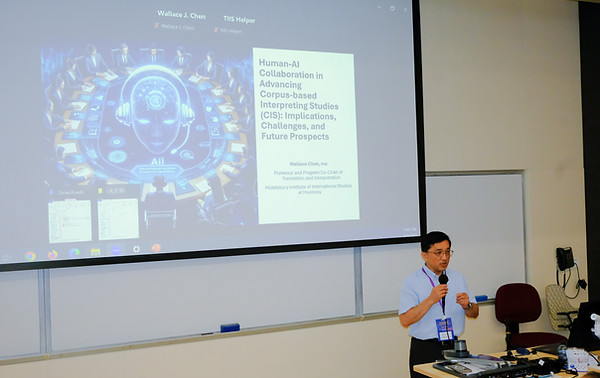

Wallace Chen
Middlebury Institute of International Studies at Monterey
Wallace Chen is Professor and Program Co-Chair of Translation and Interpretation at the Middlebury Institute of International Studies at Monterey (MIIS). He holds an MA in Chinese-English Translation and Interpretation (MIIS) and a Ph.D. in Corpus-Based Translation Studies (University of Manchester). Professor Chen has been teaching Chinese-English translation and interpretation since 1997. He has over 30 years of experience in practicing T&I, providing services to major corporations, government agencies, and international organizations. Professor Chen lectures in a wide variety of T&I areas, including professional skill development, pedagogy, T&I technology, professional assessment, T&I practice, and corpus-based T&I studies.
Human-AI Collaboration in Advancing Corpus-based Interpreting Studies: Implications, Challenges, and Future Prospects
Abstract
As in any other fields of human enquiry, Artificial Intelligence (AI) is making way into Corpus-based Interpreting Studies (CIS). This innovative methodology takes advantage of the immense algorithmic power of AI to better inform the empirical and interdisciplinary studies of interpreting corpora, bringing new perspectives to the discipline. In response to the growing demand for highly skilled interpreters in critical sectors such as healthcare and law, more and more CIS researchers are utilizing a wide variety of innovative AI tools to revisit prior research questions and explore new research agenda. The human-AI synergy in CIS has a clear potential to establish new research paradigms, change the workflow of interpreters, transform training methods, and ultimately enhance communication in multilingual settings. AI-assisted CIS offers possibilities to redefine interpreters’ roles, positioning AI as a supplementary tool that augments human capabilities rather than a replacement. Having popular AI tools such as natural language processing and machine learning at their disposal, researchers are now better equipped with new insights for examining vast interpreting corpora. This allows them to explore new interpreting universals and other complex patterns, strategies, and linguistic features previously hidden or too labor-intensive to uncover by conventional means. Nevertheless, CIS with AI integration also raises pressing ethical and professional considerations, including the potential impact on interpreter identity, concerns over algorithmic bias (dominant vs. under-studied language corpora), and the complexity involving data integrity. Human-AI collaboration in CIS thus has implications beyond mere technological advancements. New perspectives are required in creating contemporary training curricula to develop and train prospective interpreters. The AI-driven training interventions for language professionals should emphasize empowering future interpreters to achieve linguistic competence, technological informedness, and flexibility to adapt to the rapidly changing AI landscape. Furthermore, the integration of AI into CIS necessitates a continuous dialogue involving interpreters, researchers, and AI developers. The collaboration will ensure that CIS is integrated responsibly with AI technology and that the synergy is aligned properly with the core values of the interpreting profession. As the future of CIS is taking shape alongside with all the accompanying challenges and opportunities, it is crucial to have an in-depth exploration of how human researchers and interpreters will likely benefit from AI systems. Establishing a human-centered partnership with AI in CIS will supplement researchers’ abilities, augment interpreting practice, and underscore the irreplaceable value of human expertise in delivering culturally nuanced communication in an increasingly automated environment.


_JPG.jpg)
